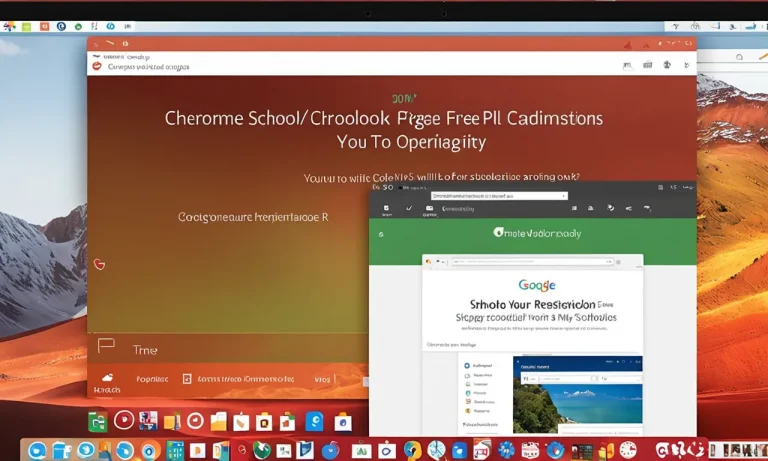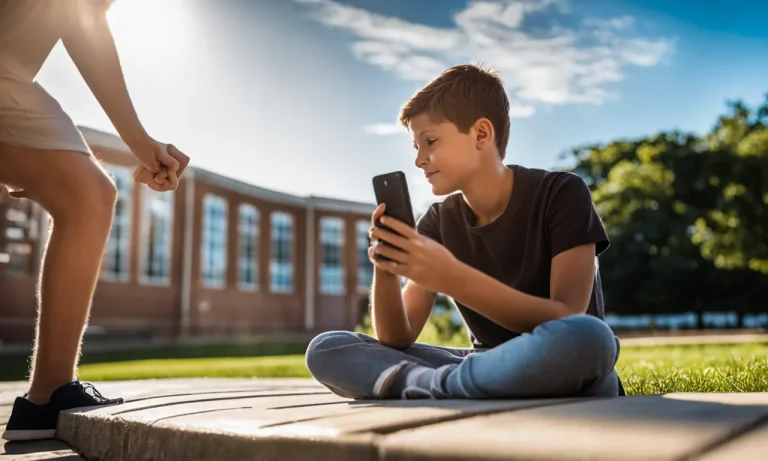In today’s technology-driven world, smartphones have become ubiquitous, even among students. While phones provide quick access to information and entertainment, they can be incredibly distracting in a school environment.
If you’re a parent or educator wondering if phones belong in the classroom, there are compelling reasons to keep them out.
View this post on Instagram
Phones Disrupt Learning
Allowing phones in schools can be a major hindrance to the learning environment. Here are three reasons why:
Makes it harder for students to focus
With the constant notifications and temptations that phones bring, it becomes increasingly difficult for students to concentrate on their studies. Research has shown that the mere presence of a phone can significantly reduce a person’s ability to focus and retain information.
The ping of a notification or the temptation to check social media can easily distract even the most dedicated students.
Enables multitasking instead of paying attention
Phones are powerful tools that allow students to multitask, but this can be detrimental to their learning. While it may seem efficient to quickly respond to a text message or browse the internet while listening to a lecture, studies have shown that multitasking actually leads to decreased productivity and comprehension.
Students who are constantly switching their attention between multiple tasks are unable to fully engage with the material being taught.
Provides constant distractions
Phones are filled with distractions that can take students away from their studies. From social media apps to games and entertainment, the allure of these distractions can be difficult to resist. Instead of focusing on their assignments or participating in class discussions, students may find themselves scrolling through their social media feeds or playing games.
This not only hinders their learning but also disrupts the learning of those around them.
According to a study conducted by Pew Research Center, 95% of teens have access to a smartphone, and 45% say they are online “almost constantly.” These statistics highlight the prevalence of phones in today’s classrooms and the potential impact they can have on students’ ability to learn.
It’s important for schools to establish clear policies regarding the use of phones in order to create a productive learning environment. By limiting the presence of phones in schools, educators can help students stay focused, engaged, and better equipped to absorb the information being taught.
View this post on Instagram
Phones Enable Cheating
One of the main reasons why phones should not be allowed in schools is that they enable cheating. With the vast amount of information available at their fingertips, students can easily look up test answers during exams.
This not only undermines the purpose of assessments but also prevents students from developing critical thinking and problem-solving skills. According to a national poll by Common Sense Media, 35% of high school students admit to using their phones to cheat in some form.
Allows students to look up test answers
Having a phone in the classroom provides students with the opportunity to cheat by looking up test answers. With just a few taps on their screens, students can access websites, online resources, or even text each other to find the answers they need.
This not only compromises the integrity of the education system but also gives an unfair advantage to those who are willing to cheat.
Makes it easy to share exam questions and answers
Another way phones enable cheating is by making it easy for students to share exam questions and answers with their peers. Students can quickly take pictures of the exam paper or send messages to their friends who have already taken the test.
This kind of unethical collaboration undermines the value of individual effort and promotes a culture of dishonesty within the classroom.
View this post on Instagram
Enables plagiarism and unethical collaboration
Phones also enable students to engage in plagiarism and unethical collaboration. With access to the internet, students can easily copy and paste information from online sources without properly attributing it.
This not only hinders their own learning but also diminishes the importance of academic integrity. Additionally, phones allow students to collaborate on assignments or projects in ways that may not be fair or ethical, as they can easily share answers and ideas without putting in the necessary effort.
It is important for schools to establish strict policies against phone usage during exams and in classrooms to maintain a fair and honest learning environment. By doing so, schools can ensure that students develop the necessary skills and knowledge through their own efforts, rather than relying on the easy way out provided by their phones.
Phones Can Be Addictive
One of the main reasons why phones should not be allowed in schools is because they can be highly addictive. Social media and games have a way of hooking students’ attention and keeping them engrossed for hours on end.
Whether it’s scrolling through Instagram or playing Candy Crush, these activities can quickly become all-consuming and distract students from their studies.
Social media and games hook students’ attention
Social media platforms like Facebook, Instagram, and Snapchat are designed to be highly engaging and addictive. The constant notifications, likes, and comments create a sense of validation and can make students feel the need to constantly check their phones.
Similarly, games with their immersive graphics and challenging levels can easily capture students’ attention and make them lose track of time.
According to a study conducted by the Pew Research Center, 71% of teens in the United States use more than one social media platform. This high usage can contribute to the addictive nature of phones and make it difficult for students to focus on their studies.
FOMO (fear of missing out) is a real concern
Another factor that makes phones addictive is the fear of missing out (FOMO). With social media platforms constantly showcasing the highlights of people’s lives, students can feel pressured to constantly stay connected and not miss out on any important updates or events.
This fear of missing out can lead to constant phone checking and distraction from schoolwork.
A study conducted by Pew Research Center found that 56% of teens feel anxious or upset if they don’t have their phones with them. This dependency on phones and the fear of missing out can have a negative impact on students’ academic performance and overall well-being.
Problematic overuse and reliance on phones
Phones have become an integral part of students’ lives, with many relying on them for various tasks such as communication, research, and organization. However, this overreliance on phones can lead to problematic overuse, where students are constantly glued to their screens, even during class time.
According to a report by Common Sense Media, teenagers spend an average of nine hours a day using media, including phones, outside of school. This excessive screen time can have detrimental effects on their academic performance, mental health, and social interactions.
Furthermore, the constant access to phones can also lead to cheating and academic dishonesty. Students can easily access answers or information during exams or assignments, compromising the integrity of the educational system.
Phones Invade Privacy
One of the main concerns with allowing phones in schools is the invasion of privacy. With the advent of smartphones, cameras and microphones have become readily available in our pockets. This raises serious privacy issues as students can easily invade each other’s privacy by taking photos or videos without consent.
In some cases, these photos or videos can be shared on social media platforms, causing embarrassment and distress for the individuals involved.
Cameras and microphones raise privacy issues
The presence of cameras and microphones on smartphones poses a significant risk to privacy. Students can record conversations or take pictures without the knowledge or consent of others. This can lead to violations of personal space and create an uncomfortable environment for students.
Furthermore, the recordings or images can be misused or shared without permission, potentially causing harm to individuals and their reputations.
Location tracking is a risk
Another privacy concern related to smartphones is the ability to track the location of individuals. Many smartphones have built-in GPS capabilities, allowing for precise location tracking. While this feature can be useful in certain situations, such as emergencies, it can also be a risk when misused.
Schools have a responsibility to protect the safety and privacy of their students, and allowing phones with location tracking capabilities can compromise both.
Private messages/photos can be shared without consent
With the increasing use of messaging apps and social media platforms, private messages and photos have become vulnerable to unauthorized sharing. Students may share sensitive information or personal photos with their peers, trusting that it will remain private.
However, once the content is on a smartphone, there is a risk that it can be forwarded or posted online without the original sender’s consent. This can lead to emotional distress and can even have legal consequences.
Phones Can Enable Cyberbullying
Cyberbullying has become a significant concern in schools, and the presence of phones has only exacerbated the issue. By allowing phones in schools, it provides new avenues for harassment. Students can easily send hurtful messages, post embarrassing photos, or spread rumors through various social media platforms.
This can have devastating effects on the mental and emotional well-being of the victims.
1. Provides new avenues for harassment
With the widespread use of smartphones, cyberbullies have found new ways to target their victims. They can create anonymous accounts, making it difficult for their identity to be traced. This anonymity gives them the confidence to engage in hurtful behavior without fear of consequences.
By not allowing phones in schools, we can limit the opportunities for cyberbullying to occur.
View this post on Instagram
2. Cyberbullying can happen discretely in class via phones
One of the biggest challenges with allowing phones in schools is that cyberbullying can happen discreetly, even during class time. Students can send hurtful messages or share inappropriate content without the teacher’s knowledge.
This not only distracts the students involved but also creates a negative and unsafe learning environment for others.
3. Harder for teachers to notice and intervene
When phones are allowed in schools, it becomes increasingly difficult for teachers to notice and intervene in cyberbullying incidents. With so many students using their phones throughout the day, it becomes challenging for teachers to monitor every interaction.
By implementing a no-phone policy, teachers can focus on creating a safe and inclusive learning environment, and promptly address any instances of cyberbullying.
According to a study conducted by the National Center for Education Statistics, 37% of students reported being cyberbullied at some point during their school years. This alarming statistic highlights the need for schools to take proactive measures to prevent cyberbullying, and one effective way is by restricting the use of phones on campus.
By prohibiting phones in schools, we can create an environment where students feel safe and protected from the harmful effects of cyberbullying. It allows teachers to be more vigilant in detecting and addressing instances of cyberbullying, ensuring the well-being of all students.
Conclusion
While phones provide quick access to information, they can be incredibly distracting for students in a school setting. Phones in classrooms disrupt learning, enable cheating, can be addictive, invade student privacy, and even enable cyberbullying.
Schools should consider prohibiting phone use during classes and exams to foster a focused learning environment. With rules in place, students can benefit from leaving phones at home or keeping them turned off and stowed away while at school.






